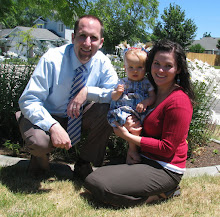Well, this past Monday, April 16th, we went in for Declan's first check-up with our pediatrician, Dr. Archibald. He said that he felt we should have the ultrasound done. He said that he would have it done if it were his child and if for nothing else but the peace of mind. So, we were scheduled for an Abdominal Ultrasound for Thursday, April 19th. Dr. Archibald said that he would call with the results. Friday we received a phone call from him stating that after reviewing the results from the Radiologist, they found that he did indeed have a Variation of Heterotaxy with Polyspleenia.
Dr. Archibald asked if Declan was having any vomiting. Declan had begun projectile vomiting on Thursday about every other feeding. Upon receiving this information Dr. Archibald asked us to go right into the hospital for a Upper GI Series to check for any Malrotation or Pylorus problems. So we headed into the hospital for more testing. Yesterday, Saturday, April 21st, we received news from Dr. Archibald that the results of the GI Series that were done indicated that Declan had Malrotation of the Duodenum.
Dr. Archibald said that he wanted to talk with a Pediatric GI Specialist and a Pediatric Surgeon to decide what needed to be done. He called us back to inform us that Declan would need surgery in the next few weeks. He told us that we would need to establish care with a GI doctor and that we would need to meet with the Pediatric Surgeon on Wednesday of this week (April 25th) to discuss surgery options.
We will try and keep the blog updated often to inform everyone of what is going on. Thank you so much for all of your support and prayers on our behalf! We truly feel loved. And we are so blessed to have Declan in our lives!
*For those of you who are interested here are some helpful descriptions of Declan's Diagnosis'
Heterotaxy Syndrome (Isomerism)
Before you begin reading about heterotaxy syndrome, please read the explanation of how the normal heart works for a basic understanding of its structure and function.
Heterotaxy syndrome is a rare birth defect that involves the heart and other organs. The beginning of the word (hetero-) means “different” and the end (–taxy) means “arrangement.”
In heterotaxy syndrome, paired organs, such as the lungs or kidneys, are often mirror images of one another instead of having the unique characteristics of right and left that are normally present.
There are different forms of heterotaxy syndrome. All usually involve heart defects, of varying type and severity. In addition, organs such as the stomach, intestines, liver and lungs may be in abnormal places in the chest and abdomen.
- The intestines may have malrotation, which is when the loops of bowel are lined up incorrectly. With this problem the bowel can twist on itself (volvulus). Many children with malrotation need abdominal surgery to correct it.
- Some children with heterotaxy syndrome can have a very serious condition of the liver called biliary atresia. This also may require surgical intervention.
- There may also be irregularities with the skeleton, central nervous system and urinary tract.
- In some cases of heterotaxy syndrome, the spleen may not work correctly or may be missing entirely. This can cause many problems, because the spleen helps the body fight infections. When the spleen is missing or doesn’t work correctly, patients have a more difficult time recovering from surgeries or infections (patients with heterotaxy may require multiple surgeries). In some cases, there may be a functioning spleen, but it may be divided into several smaller spleens (polysplenia).
- Sometimes children with heterotaxy syndrome have dextrocardia syndrome. This means the heart is in the right chest instead of the left chest.
Polysplenia
Polysplenia or left atrial isomerism: Children with this condition may have septal defects (holes between the tissue dividing the two sides of the heart) as well as problems with heart valves and the heart’s electrical system. Some children with this problem havecomplete heart block, which is when the upper-chamber electrical system does not communicate with the lower-chamber electrical system. Most children require pacemakers for this problem. The spleen may be absent, or there may be several small spleens (polysplenia), instead of one spleen.
Malrotation
Malrotation is twisting of the intestines (or bowel) caused by abnormal development while a fetus is in utero, and can cause obstruction. Malrotation occurs in 1 out of every 500 births in the United States.
Some children with intestinal malrotation are born with other associated conditions, including:
- other defects of the digestive system
- heart defects
- abnormalities of other organs, including the spleen or liver
Of the Duadneum
Duodenal obstruction is a partial or complete obstruction of the duodenum, the first part of the small intestine. Obstruction prevents food from passing through the digestive tract, interfering with digestion and nutrition.
The duodenum is the first part of the small intestine, extending from the valve at the bottom of the stomach that regulates stomach emptying (pylorus valve) to the second part of the small intestine (jejunum). It is a short but often troublesome section of the digestive tract. The stomach, gallbladder, and pancreas each empty their contents into the duodenum in anticipation of digestion. Obstruction prevents the normal passage of stomach contents into the duodenum and keeps the gallbladder and pancreas from draining their secretions. This problem can lead to a number of conditions and complications involving digestion, nutrition, and fluid balance. In infants and children, congenital defects (anomalies) usually cause duodenal obstruction, and symptoms are present at birth or shortly after when the infant attempts to feed.
When obstruction occurs, regardless of cause, food, gas, and secretions from within the intestine will accumulate above the point of obstruction, bloating (distending) the affected portion of intestine. Infection of peritoneal tissue lining the intestines and the abdomen (peritonitis) may result from bacteria growing in the accumulation of undigested material. As the distention increases, fluids continue to increase, and the intestine absorbs less. The fluid accumulation and reduced absorption lead to bilious vomiting, which is the vomitus will appear greenish, the classic sign of upper intestinal obstruction. Persistent vomiting or diarrhea (which can occur in a partial blockage) can result in dehydration. Fluid imbalances upset the balance of specific essential chemicals (electrolytes) in the blood, which can cause complications such as irregularheartbeat and, without correction of the electrolyte imbalance, shock.
In newborns, congenital duodenal obstruction can occur when the duodenal channel (duodenal lumen) is not correctly formed (recanalized) during fetal development. The duodenum may have a membrane reducing the channel size (lumen), or two blind pouches instead of one duodenal channel, or a gap or flap of tissue may be present. In each case, the channel is not be sufficiently developed at birth or sufficiently open to allow the passage of food and liquid, resulting in poor digestion and poor nutrition. This condition is known as duodenal atresia, and it results in duodenal obstruction. About 30 to 50 percent of infants born with duodenal atresia also have Down syndrome, and some have cardiac abnormalities as well. Duodenal atresia can occur with other conditions such as a narrowing of the duodenal lumen (duodenal stenosis) or twisting of the duodenum around itself (duodenal volvulus). It may also occur in combination with volvulus in another part of the bowel below the duodenum. Inflammation of the pancreas (pancreatitis) may also accompany duodenal atresia.
Malrotation of the duodenum is a more common cause of duodenal obstruction, typically appearing in the first few weeks of life. In malrotation, the duodenum is usually coiled to the right, causing obstruction of the duodenum and failure of the stomach contents to pass through to the next portion of small intestine. Malrotation may also involve the presence of Ladd's bands, abnormal folds or bands of tissue under tension across the lumen of the duodenum. Malrotation can also occur with duodenal volvulus or volvulus lower in the bowel. With volvulus, it can result in serious consequences by cutting off the supply of blood to a portion of bowel (strangulation), reducing the flow of oxygen to bowel tissue (ischemia), and leading to tissue death (gangrene) and shock or to rupture (perforation) of the intestine. Surgery is required immediately to correct this type of duodenal obstruction.
Read more: http://www.answers.com/topic/duodenal-obstruction#ixzz1snzazeFn
















3 comments:
Hi my name is Ana Luis and I came across your blog today. My daughter Chloe has heterotaxy, polysplenia syndrome. I am attaching a couple of links for you where you can find other parents of kids with heterotaxy.
https://www.facebook.com/#!/pages/The-Heterotaxy-Network/175957265777460
https://www.facebook.com/#!/pages/Heterotaxy-Hope-Organization-H20/276596106190
Hi Ashley! I have been thinking of you and your family and praying for you all. I am certain that Declan will do well with his surgeries...God will have his back :)
Marcy
Ashley, what a bummer! He will be awesome though, he seems like a strong little guy. Let us know when we can watch Paige next. :)
Post a Comment